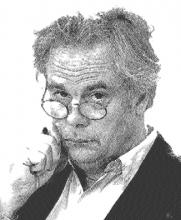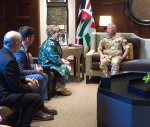You are here
Power grows out of the barrel of a gun
Jul 30,2015 - Last updated at Jul 30,2015
Why do major powers arise? At a time when we talk about the rise of China and India, the said weakening of the US and the European Union, and the thwarted ambitions of Russia, it is a good time to ponder this question. Between 1492 and 1914, the Europeans conquered 84 per cent of the globe. The puzzle is why did they rise to the top when for centuries the Chinese, Japanese, Ottomans and South Asians were far more advanced?
The short answer, as Mao Zedong once said, is that “Power grows out of the barrel of a gun”.
Europeans were at the forefront of gunpowder technology for 200+ years.
This may seem odd since firearms and gunpowder originated in China and the rocket in India. Yet by the late 17th century, Chinese, Japanese and Ottoman military technology was lagging behind Europe’s.
War was what monarchs did in Europe. War often had become, in the words of Galileo, a “royal sport”. Thomas Hobbes wrote that glory and reputation were one of the three causes of war. Another cause was that tax rates were so much higher in Europe than in the East — funds for war were often plentifully available. But on the other side of the world, kings, princes and even military leaders were much less bellicose. The Europeans spent a far higher proportion of their national income on warfare — twice what was spent in China. Although China could have conquered neighbouring states it showed little interest in doing so.
But why were the Europeans so successful compared with the rest of the world? In a new book, “Why Did Europe Conquer The World”, Professor Philip Hoffman of the Californian Institute for Technology suggests some of the answers.
Europeans had no hegemon, as China did. It was made up of independent states that were often at war with each other. Competition pushed arms technology forward. Glory and the defeat of religious enemies kept the waging of war on the boil.
Europe was fragmented from the time of the fall of the Roman Empire. If Charlemagne’s mediaeval empire had remained intact for another generation then perhaps a dominant power might have emerged in Europe. By contrast, China was unified under an empire for nearly half of the two millennia between 221BC and AD 1911. Consequently China was often the dominant power in East Asia, which meant that fewer rivals would challenge it and force it to spend heavily, not least on developing the gunpowder power of its armaments. Moreover, to fight the raiding Mongols on horseback, its one significant enemy, bows and arrows were more suitable.
Japan slowed down its development of gunpowder technology when the Tokugawa Shogunate united the country, ending civil war.
In India in the 18th century, as the Mughal Empire disintegrated, the leaders and states fought constantly, but were unable to mobilise resources on a large scale as they inherited a very decentralised empire. Faced with Britain’s East India Company and its massive financial resources raised in Europe’s burgeoning capital markets and its advanced armaments they succumbed to its military prowess. In China, the East India Company’s steam-powered gunboats bullied their way into trade concessions during the first Opium War.
For its part, the Ottoman Empire suffered from skimpy tax receipts and the corruption of local leaders who collected taxes.
Russia, however, did become a great power and challenged Western Europe on occasion. The czars, particularly Peter the Great, conscripted huge numbers of serfs. Peter and, later, Catherine the Great were finely attuned to developments in Western Europe. They borrowed almost everything, not the least the latest in gunpowder technology. The Russian navy wiped out the Ottoman fleet by firing new explosive shells instead of traditional solid cannon balls.
By the time of 1814 and the creation of the peacemaking Concert of Europe, Europeans had had enough of centuries of war on their own soil. But Europeans continued to fight each other (and the local people) in Africa, the South East Asian islands and the Caribbean. This kept the research into new weapons going. In Rhodesia, Cecil Rhodes used 700 Europeans with machine guns to overcome 5,000 rifle-bearing Ndebele warriors. The poet Hillaire Belloc wrote:
“Whatever happens we have got
The Maxim gun, and they have not”.
Conquest in the Caribbean led to such high profits from the slave trade and sugar exports that it funded a large part of Britain’s Industrial Revolution.
What does this mean for today — a race to have the most modern military? Surely not. Europe, shedding the Concert of Europe, tore itself apart in 1914 and again in 1945. That is where the full stop in this story should have been put. The destruction was beyond understanding. Countries today that aspire to use their “gunpowder” to dominate the world must think again. It is to the US, China and Russia, I speak.













